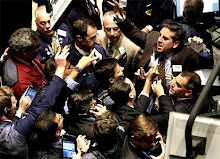Former Fed Chair Alan Greenspan has an op-ed in the WSJ arguing that the runaway Federal Deficit threatens to turn the US into the next Greece.
He doesn't actually think that the US debt bears any credit risk, due to our ability to print at will, but that there is a substantial risk that borrowing costs will soar.
Of course, market participants are aware of our towering deficit, and yet yields continue their long march lower, so that's kind of problematic to his world view.
Says Greenspan: "This is regrettable, because it is fostering a sense of complacency that can have dire consequences."
Yet, he argues, not all market signals are so benign:
In the wake of recent massive budget deficits, the difference between the 10-year swap rate and 10-year Treasury note yield (the swap spread) declined to an unprecedented negative 13 basis points this March from a positive 77 basis points in September 2008. This indicated that investors were requiring the U.S. Treasury to pay an interest rate higher than rates that prevailed on comparable maturity private swaps.
The negative swap rate garnered a fair amount of attention back during March, which was actually when the markets were hottest. At the time, just as many folks seemed to think that it had more to do with aggressive risk appetite on the part of investors, than it did some lack of confidence in the US system.
Greenspan could actually be correct in his interpretation, but it's by no means definitive, and on its face it seems absurd that if folks were seriously concerned about inflation or US credit risk, that private swaps would somehow be more preferable.
It may serve us well to listen to the deficit Cassandras, but for now the "regrettable" markets show that investors rush into the debt and currency of the world's two gigantic debtor nations -- the US and Japan -- at the first signs of trouble.
Friday, June 18, 2010
Subscribe to:
Post Comments (Atom)


No comments:
Post a Comment